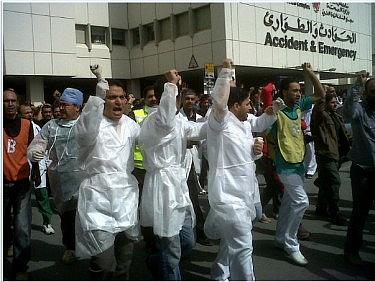Ireland, Which Trained Doctors at Center of Bahrain Clampdown, Now Fights for Them

This week, a delegation from Ireland is expected to meet with officials in Bahrain to lobby them to drop the charges against dozens of doctors and nurses who have been arrested and reportedly tortured for treating victims of the government's crackdown on protesters there.
According to Susan Mitchell at The Sunday Business Post, the delegation will include: former Minister for Foreign Affairs David Andrews, Senator Averil Power, and Marian Harkin, a member of the European Parliament.
Harkin made her case for strong diplomatic condemnation of the arrests when speaking to the European Parliament last month.
"This kind of action is totally unacceptable," she said. "I'm calling publicly on our High Representative Patty Ashton – I've already written to her – to ask her to make every effort to intervene on behalf of those medics, who simply did what medical personnel do: tried to save lives."
As Mitchell wrote, the Bahraini physician's "plight has been followed by the world's media but has a particular resonance in Ireland as three of the Bahraini doctors trained at the Royal College of Surgeons in Ireland (RCSI)."
According to Mitchell, some doctors in Ireland have been critical of the RCSI, which is the leading physician's training organization in Ireland, for not publicly condemning the Bahraini government.
The RCSI refused to condemn the arrests for three months. In the meantime, medical organisations worldwide - including Physicians for Human Rights, the American College of Physicians, England's Royal College of Surgeons, the National Arab American Medical Association and the American Medical Association - petitioned the Crown Prince of Bahrain to stop attacking hospitals, patients and doctors.
One of those critics is orthopedic surgeon Dr. Damien McCormack, who has written forcefully on the Bahraini physicians' behalf. McCormick's involvement is personal because the doctors who have been targeted as leaders of an anti-government group trained under him. One of them is Dr. Ali alAkri. As Mitchell wrote:
A trawl through BBC and al-Jazeera footage from the time of the mass protests clearly shows doctors speaking out passionately as wounded protesters were rushed into hospital. One, Ali alAkri, struggled to hold back tears as he pleaded with the government to stop the killings. AlAkri was identified as the main ringleader of the doctors' conspiracy by the Bahraini prosecutor.
Mitchell shows the burden that reporters carry when they turn on their cameras or even jot down names and quotes in a notebook during crises like the one in Bahrain. She spoke with a BBC correspondent who had been part of the team filming alAkri and who was, as she writes, "one of only two reporters allowed into court to hear the charges."
The correspondent told Mitchell:
He did not look like a ringleader to me. Passionate, angry, distraught, yes. The leader of an anti-government coup? No. His real crime was to have spoken out to us, the foreign media, to have told the outside world what was going on inside his hospital. Of the effects of buckshot and tear gas. To show X-rays of high-velocity bullets embedded in protesters' bodies.
Those words are a reminder to journalists everywhere of the care we must all take in understanding the consequences of reporting – even accurate reporting – in highly charged situations and in countries where freedom of speech is not widely enjoyed. Jonathan Watts of the Guardian talked with me about this last year with regard to China. The words are also a call to all of us to do what we can to keep this issue alive until the sword dangling over these health workers' heads is removed.
McCormick told Mitchell, "While we are debating this at home the clock is ticking. The Bahraini authorities are temporising and delaying. It is becoming more difficult to keep this in the news."
Related Post:
Doctors Behaving Beautifully: Bahrain docs, nurses risked their lives to treat protesters
Photo credit: GlobalVoicesOnline

